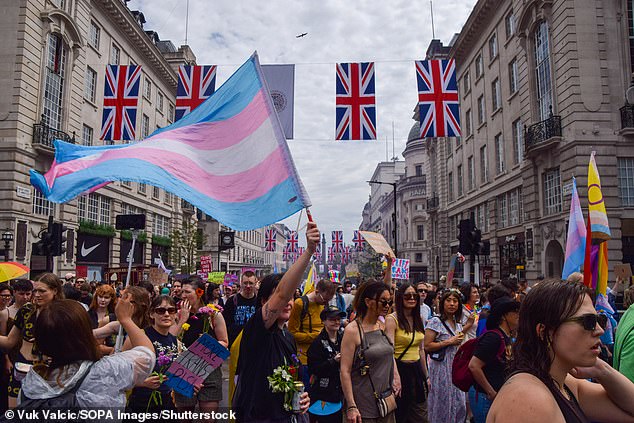The number of Britons requesting a gender change has risen by 75 per cent in just two years, official figures show


New statistics show that millennials and Gen Zers are driving more people to legally change their gender.
According to data from the government’s Gender Recognition Panel (GRC), nearly 1,400 people applied to change their gender from male to female or vice versa in 2023-24.
This is a 75 percent increase compared to two years earlier, when only around 800 Britons made such an application.
And that number is three times higher than just before the Covid pandemic, when only 443 applications were submitted.
This increase is partly driven by a growing number of Gen Z and millennials wanting to transition gender.

Nearly 1,400 people applied to change their gender from male to female or vice versa in 2023-24, according to data from the government’s Gender Recognition Panel (GRC).
According to official figures, around 700 applications in recent years came from Britons born after 1990.
By comparison, two years earlier, around 370 Britons from this group wanted to change gender.
Although over time more and more older groups are wanting to change gender, they are clearly being overtaken by the younger generations.
Another factor that could explain the increase is the decrease in the price for gender recognition applications.
It used to cost £140 to change your gender in the UK, but from 2020-2021 this has dropped to just £5.
Of the applications for gender changes in the past year (1,400), almost 1,100 have been granted.
However, the numbers could rise further as the new Labour Party has pledged to make the gender recognition process easier.
The figures are expected to rise further after Labour pledged during the election campaign to simplify the process.
Under current rules, Britons who want to change their gender must be over 18, have been diagnosed with gender dysphoria in the UK, have been living as their desired gender for at least two years and intend to live as that gender for the rest of their lives.
There are also other criteria that do not require a diagnosis of gender dysphoria, such as living as your desired gender for six years and having undergone gender confirmation surgery. However, the GRC says that you should contact them in these circumstances, as the process is different.
Once an application is filed, a panel of lawyers and doctors will decide on the case within a set period of 22 weeks.
Applicants must provide documentation, such as two doctor’s reports, as proof of their application.
But the Times reports that Keir Starmer’s government plans to change this “dehumanising” process to just one doctor consulting a gender specialist and not having to provide proof of their desired gender.
Data from the most recent year also shows that for the first time, the number of women wanting to change gender to male is approximately equal to the number of men wanting to change gender to female.




